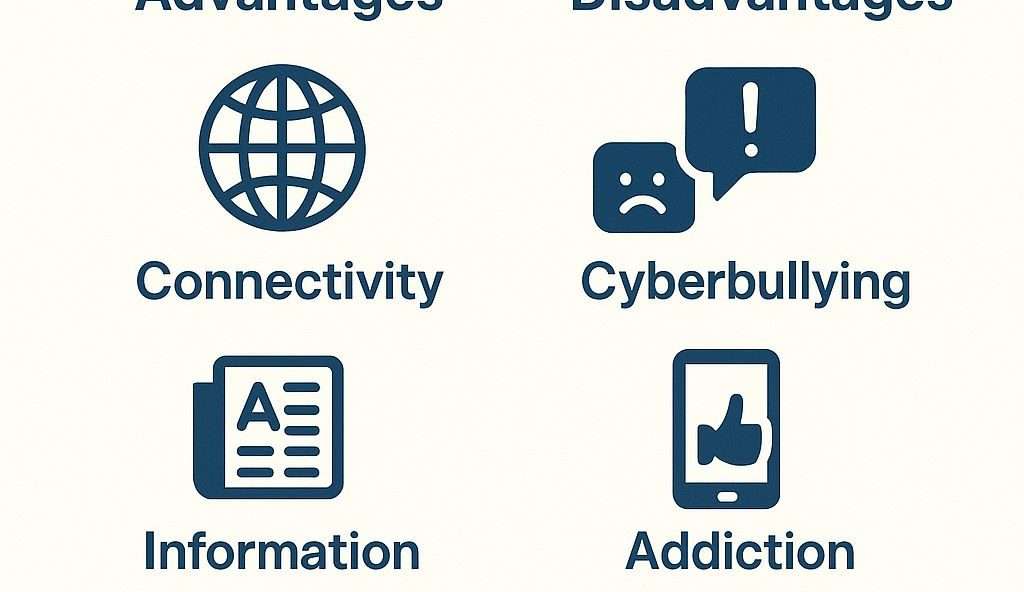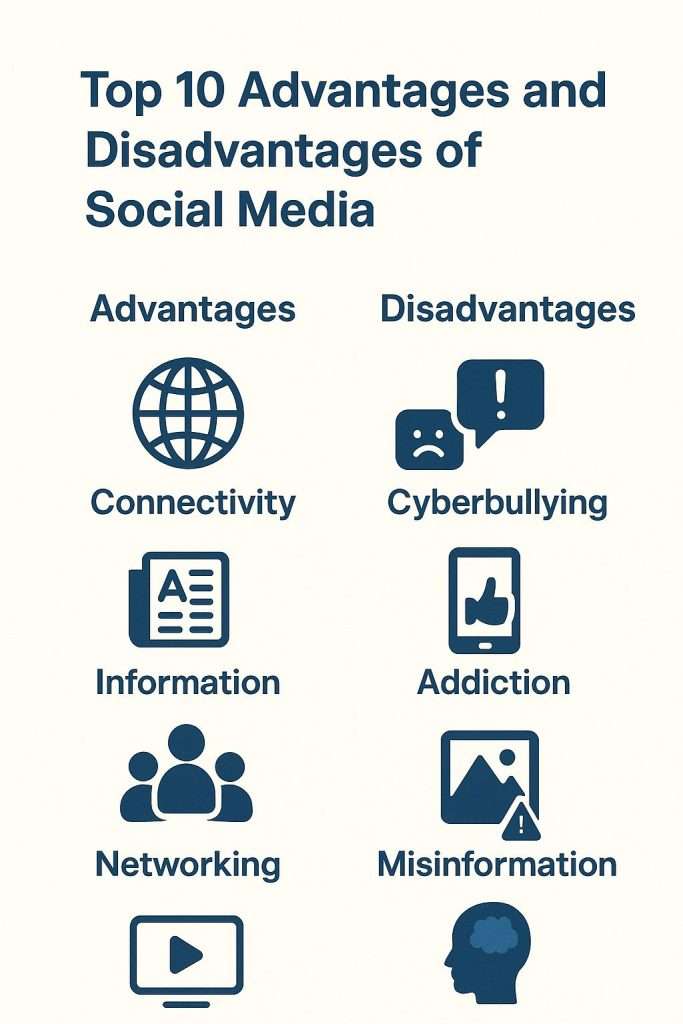
Top 10 Advantages and Disadvantages of Social Media
Social media has become a powerful part of our daily lives. Whether it’s scrolling through Instagram, catching up on Twitter (X), networking on LinkedIn, or watching short reels on YouTube, we spend hours engaging with online communities. For some, social media is an entertainment source; for others, it’s a career, a marketing tool, or even a learning platform.
But like every coin has two sides, social media also brings both advantages and disadvantages. While it connects billions of people worldwide, it also creates challenges related to privacy, mental health, and productivity.
In this blog, we’ll explore the top 10 advantages and disadvantages of social media to help you understand its impact on modern life.

Top 10 Advantages of Social Media
1. Global Connectivity
One of the greatest benefits of social media is that it connects people across the globe. You can chat with friends, video-call family members abroad, or network with professionals in different countries—all in real time. Platforms like Facebook, WhatsApp, and LinkedIn have removed geographical boundaries, making the world a smaller place.
2. A Source of Information and Awareness
Social media is a modern-day information hub. Whether it’s breaking news, government updates, or trending topics, platforms like Twitter (X) and Reddit provide instant access to information. Many people rely on social media for health tips, educational resources, and awareness about social issues.
3. Business Growth and Marketing
For businesses, social media is no less than a goldmine. Brands use Instagram, YouTube, and TikTok to promote products, engage with customers, and build strong online visibility. Small businesses especially benefit from cost-effective advertising campaigns and influencer partnerships.
4. Educational Opportunities
Students and professionals use platforms like YouTube, Coursera, and LinkedIn Learning to enhance their skills. Study groups, online communities, and digital libraries on social media make learning more accessible and affordable.
5. Entertainment and Relaxation
From funny memes to trending reels, social media is a hub of entertainment. YouTube videos, Instagram reels, and Facebook stories provide relaxation after a stressful day. It is also a platform for creativity where people share their talents through music, art, dance, or comedy.
6. Career Opportunities
LinkedIn and other professional platforms help job seekers connect with recruiters and companies. Many people have found freelance gigs, internships, and full-time jobs through social media networks. For professionals, it’s an excellent way to showcase achievements and build a personal brand.
7. Customer Engagement for Brands
Brands use social media to engage directly with their customers. Whether it’s through Instagram polls, Twitter replies, or YouTube comments, businesses get real-time feedback. This helps companies improve products and build stronger relationships with their audience.
8. Promoting Social Causes
Movements like #MeToo and climate awareness campaigns gained momentum through social media. It gives people a platform to raise their voices, spread awareness, and bring about change. For NGOs and activists, it’s an essential tool to reach millions within seconds.
9. Building Communities
Social media allows like-minded people to form groups and communities. From photography clubs to fitness groups and mental health support pages, there’s a community for everyone. These groups provide support, encouragement, and shared learning.
10. Opportunity for Personal Growth
By sharing content, interacting with diverse individuals, and gaining feedback, social media users develop confidence and new skills. Many influencers, writers, and creators started small but built successful careers purely through social media.
Top 10 Disadvantages of Social Media
1. Addiction and Time Waste
One of the biggest drawbacks of social media is addiction. People often scroll endlessly, spending hours on unnecessary content instead of being productive. This can negatively affect studies, work, and real-life social interactions.
2. Privacy Issues
Data leaks, identity theft, and cyberbullying are major concerns on social media. Many users unknowingly share personal details, making themselves vulnerable to scams and hackers.
3. Mental Health Concerns
Studies show a link between excessive social media use and anxiety, depression, or low self-esteem. Constant comparisons with others’ lifestyles create feelings of inadequacy and social pressure, especially among teenagers.
4. Spread of Fake News
Misinformation spreads quickly on platforms like Facebook and Twitter (X). Fake news related to politics, health, or finance can mislead people and sometimes even cause panic or violence.
5. Cyberbullying and Online Harassment
Social media anonymity often gives rise to bullying and harassment. Many people, especially teenagers, face online abuse through hateful comments, trolling, and threats.
6. Reduced Face-to-Face Communication
While social media enhances digital connections, it weakens real-life interactions. People often prefer chatting online instead of spending quality time with family or friends. This can reduce emotional bonding and real-world communication skills.
7. Negative Impact on Productivity
Employees and students often get distracted by constant notifications, memes, or reels. This leads to procrastination and reduced efficiency in work or studies.
8. Health Issues from Excessive Use
Spending long hours on mobile screens leads to health issues like eye strain, poor posture, obesity, and disturbed sleep. Blue light from phones also affects sleep cycles.
9. Online Scams and Fraud
Many fraudsters use social media to trick people into investing in fake schemes or sharing bank details. Phishing links, fake job offers, and investment scams are common traps.
10. Loss of Authenticity
On social media, many people showcase only the glamorous side of life. This “perfect picture” lifestyle often creates unrealistic standards, making it hard to distinguish reality from fiction.
How to Balance Social Media Use
While social media has clear pros and cons, balance is the key. Here are some tips:
- Set screen time limits to avoid addiction.
- Verify information before sharing or believing.
- Use privacy settings to protect personal details.
- Take regular digital detoxes to improve mental health.
- Follow meaningful accounts instead of random entertainment pages.
FAQs on Advantages and Disadvantages of Social Media
Q1. What are the top benefits of social media for students?
Social media helps students access study materials, join online classes, and connect with peers for group learning.
Q2. Can social media affect mental health?
Yes. Overuse can lead to anxiety, stress, and depression due to comparisons and cyberbullying.
Q3. Is social media good for business?
Absolutely. It’s one of the most cost-effective marketing tools for startups and established businesses alike.
Q4. How can I avoid social media addiction?
Set daily time limits, turn off unnecessary notifications, and spend more time in offline activities.
Final Thoughts
Social media is neither purely good nor entirely bad. It’s a double-edged sword that depends on how we use it. On one hand, it connects people, spreads awareness, and opens new career opportunities. On the other hand, it can lead to addiction, mental health problems, and privacy risks.
The key is mindful usage. If used wisely, social media can empower individuals, businesses, and society as a whole. But if overused, it can be harmful. So, the next time you open your favourite app, remember: control social media—don’t let it control you.



